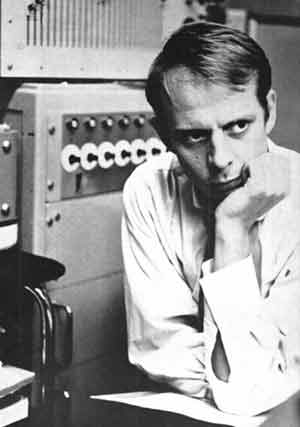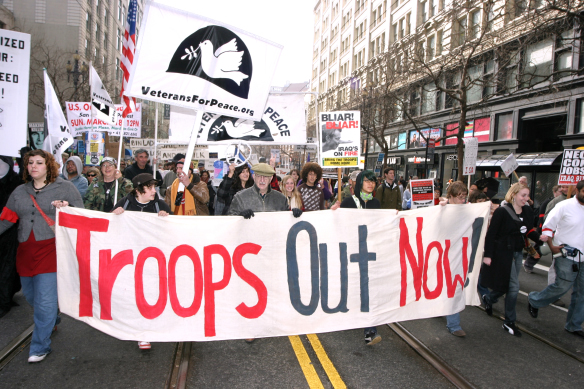 He seems to be everywhere. Olivier Besancenot has a prominence in the political arena that now goes beyond his wildest dreams. RESPECT has fraternal links with his party the LCR who are now attempting to build a broad party in France to link those against war, racism, privatisation and the destruction of the environment
He seems to be everywhere. Olivier Besancenot has a prominence in the political arena that now goes beyond his wildest dreams. RESPECT has fraternal links with his party the LCR who are now attempting to build a broad party in France to link those against war, racism, privatisation and the destruction of the environment
This is a far cry from the time when Alain Krivine presented his young protegé, the future presidential candidate, to the press, saying: “Isn’t he nice?” Six years later, this chubby little Tintin face is now ubiquitous on the left, on the TV screen with Canal+ or i-Télé, on the radio waves, and in the columns of Le Parisien … He even takes pride of place in a double page spread in Paris Match, sitting on a stool in an 18th District [Clichy/Montmartre] bistro, posing beneath a photo-portrait of Che Guevara. And the ultimate tribute: a team from “Groland”, a satirical programme with a big youth following, turned out for his last meeting in Paris on 22 November at the Mutualité hall.
The popularity polls, which place him just behind Ségolène Royal and Bertrand Delanoë [Parti socialiste, Mayor of Paris], have become accustomed to this rapid media breakthrough. First it was the BVA poll, which gave the young postworker a 40%-favourable rating, just behind the Mayor of Paris, then the Ipsos poll, and lastly the Sofres poll. Olivier Besancenot, 33 years old, now competes with major figures in the Parti socialiste [PS] for prime position on the Left. That would seem to show that his party, the Ligue communiste révolutionnaire (LCR), is right to claim that it has become “the sole beacon of socialism in the midst of a Left that has collapsed”.
At his meetings, his mentors, Alain Krivine and François Sabado, who not so very long ago had him repeat their scripts, are now placed on the second rank, as onlookers delighted at their success story. “He’s very good”, they keep repeating, when the young leader thrills his audience by insisting that he wants them to be “the Left that sticks to its guns”, set against the PS, which is “nowhere” and which will have to “relearn the habit of carrying placards on demos”. Even those who have only ever seen the “League” at the political margins can now take delight in this
After thirty years of standing Krivine as their candidate, these older members decided they’d have to take a gamble on recognising the “generation gap” if they wanted to be able to compete with the popularity of “Arlette” (Laguillier) [the candidate of Lutte Ouvrière]. The results they obtained in 2002 (4.27% of the vote) and especially the 4.08% of the vote in the Presidential Election of May 2007 (twice the vote of Laguiller or of Buffet, the Communist Party candidate), have outstripped all their predictions and have decisively placed Besancenot at the head of the radical Left.
Over the past month, they seem to have moved on a further stage and established themselves in direct competition with a PS that has become too pragmatic and which no longer knows how to put clear water between itself and the Right. “The PS doesn’t represent any alternative, and has left a vacuum which Besancenot now fills”, says Vincent Tiberj, Research Fellow at Cevipof, the Political Research Centre of Sciences Po [a political-science university institute in Paris]. This phenomenon has become more marked in the wake of the Presidential Election. An IFOP opinion poll commissioned by Le Journal du dimanche, and published on 2 November, shows that 7% of those interviewed would vote today for Besancenot. The surge in support is particularly strong among among manual workers (12%) and clerical workers (11%). “The PS seems to lack any line or leader that it can put up against Sarkozy. On the Left, only the postie [i.e. Besancenot] remains as the opposition”, according to the analysis of Jérôme Fourquet, director of IFOP.
Besancenot remains a militant and, since the end of the summer holiday period, he has been trying to stick as closely as possible to the course taken by working class struggle. He is everywhere, among the homeless on the rue de la Banque, at a demonstration supporting “users of the Postal Service”, at Colombes for a press conference against the EPR nuclear power station. When he has his say in the television studios, he always mentions an example of “workers in struggle” with whom he has met just beforehand. Playtex, Yoplait, Nestlé, Citroën or Well … He conveys the anger of workers and the demands of those who have been pushed to their limit.
A strike breaks out in the SNCF? He is the first to come out in public to offer his support to the railway workers, rushing down the day before the strike began to the depot at Sotteville-lès-Rouen to ask “the guys to stand firm”. The railway workers received him like one of their own. Alongside the marches during the big demonstrations in Paris, he was given cheers: “Hold out, Olivier! You’re not alone.” In the union offices, his interviews were now being pinned up on the notice boards: “He was already popular, but here he was just brilliant”, says his friend from the 18th District, Basile Pot, switchman at the Gare de l’Est. “There is so much confusion in the way the PS expresses itself politically that people can identify with his straight talk”, says Annick Coupé, spokesperson for Solidaires, the union grouping that comprises the various SUD sections [a militant rank-and-file based union movement that has grown over the past 20 years]. “He had the intelligence to see that there was a political space left empty” as Communist Party deputy Patrick Braouezec concedes.
From 2001 onwards, the young leader of the LCR has been able to show that he is different. There is the casual style: the dark jeans and black t-shirt he always wears, his simple and punchy way of speaking with finely honed slogans, and his stance as “just another wage earner like everybody else” which he insists on in contrast to the suits and ties of the notables. He is just as happy to advertise his friendship with the rappers Joey Starr et Monsieur R as he is to advertise his admiration for Che Guevara. “In the political arena, you get the impression that he comes from another planet”, laughs Léon Crémieux, a member of the LCR’s Central Committee.
The style may be out of place on the Left, but the younger generation is happy with it. “By drawing new causes like ecology and anti-globalisation into the arena, he’s been able to build up a base among first-time voters”, as the researcher Vincent Tiberj emphasises. Within the generation born between 1977 and 1982, Besancenot’s vote has reached 12%.
Besancenot continues to work on his “prole” and youthful niche. His public image receives the attention of his whole team. For his interviews, he chooses Le Parisien and free papers like Métro and 20 Minutes. And he prefers to reply to the enquiries of RMC Info, “a radio station of the people”, rather than the large media outlets for more general audiences. “For lots of workers, these are the only sources of information. It’s become our means of political communication”, as Léon Crémieux says by way of justification. Not to forget the radio stations based in the outlying districts, “to reach the young people in the big housing estates”.
Jonathan Walker translated this Le Monde article on Olivier Besancenot. It is republished from International Viewpoint magazine
 Another year gone. Good friends we've lost.
Another year gone. Good friends we've lost.
















